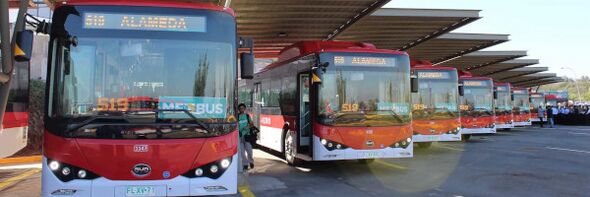Electric Bus Deployments in Santiago de Chile
| Electric Bus Deployments in Santiago de Chile | |
 Electric Bus Deployments in Santiago de Chile | |
| Team Organizations | Chilean Ministry of Transport Enel X BYD |
| Point of Contact | Wilfred Pinfold |
| Participating Municipalities | Santiago de Chile |
| Sectors | Transportation |
| Initiative | |
| Status | Launched |
| Last Updated | February 3, 2026 |
Summary
An electric bus implementation program in Santiago, Chile, inspired by the buses in Bogotá, Colombia, began in 2014 through a partnership between the Chilean Ministry of Transport and two privately held companies, Enel X and BYD, an Italian electric company and a Chinese bus making manufacturer, respectively.
This transportation design was created as a way to promote sustainable mobility in two ways. First, electric buses are substantially cheaper to operate, lowering the cost by 70% compared with typical diesel vehicles.[5] In fact, a year-long pilot of this project found that the cost of operating the electric bus was only $0.10/kilometer compared to operating a diesel bus at $0.43/kilometer.Second, by using electric vehicles the city attempts to decrease the air pollution and noise pollution, improving the overall quality of life for residents and tourists visiting Santiago, while also making strides in the switch to an entire zero-emission public transportation system that the city has promised by 2040.
In 2017, the first three entirely electric buses were deployed into the public transport system within the city. At the end of 2019, 400 electric buses were integrated into the current public transportation system, making history and placing Santiago as the city "with the second largest number of electric buses outside of China." Additionally, in the same year, the first 100% electric bus corridor in all of Latin America was finished and put into use in Santiago and includes 40 bus stops with multiple charging stations, allowing the electric buses to be fully charged in just 5 hours. The city of Santiago continues to replace the current diesel operated buses with fully electric buses and is creating even more electric bus corridors to recharge and store these buses when not in use. Today, 455 of the 700 buses operating in the city of Santiago are electric and it is estimated that by the end of the year 2020, nearly 800 electric buses will take the city streets.